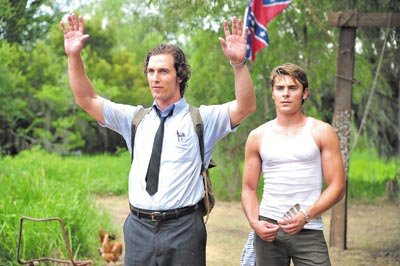Out Philly-born filmmaker Lee Daniels’ deliciously lurid Southern gothic tale “The Paperboy” — opening Oct. 12 at Ritz Five —likely will be best remembered for its outrageous moments. There is already a much-ballyhooed scene of Charlotte Bless (Nicole Kidman) urinating on jellyfish-stung Jack Jansen (Zac Efron). Add to that a vivid episode involving a person naked, bloodied and tied-up, face-down, in a hotel room.
But look past these pulpy bits — and some vulgar, erotic scenes with Charlotte and death-row inmate Hillary Van Wetter (John Cusack) — and “The Paperboy” is actually an absorbing and sometimes intense thriller.
Blending issues of race, class and sexuality, this potboiler, based on the novel by Pete Dexter (who co-wrote the screenplay with Daniels), concerns Ward Jansen (Matthew McConaughey) returning home to investigate Charlotte’s claim that her prison pen pal/fiancé Hillary is innocent. But this slinky, horny woman, dressed to thrill, is not necessarily thinking with her mind. Just witness the explicit exchange between Charlotte and Hillary when they first meet. It’s hotter than the sweltering Florida summer.
Daniels deliberately tries to get audiences hot and bothered. He has Kidman dress up like slutty white trash — in tight pants and bleached-blonde hair, oozing sexuality. Daniels fetishizes the gorgeous, buff and bronze-bodied Efron, filming him bare-chested or in his undies at every opportunity. A scene in which Charlotte and a near-naked Jack dance in the rain may cool off the characters, but not viewers who crave guilty pleasures.
The film is narrated by Anita (Macy Gray), the maid at the Jansen household. She may be the film’s moral center, but there are suggestions Anita may not be an entirely reliable narrator. She cares mostly for Jack, a swimmer kicked out of college who is now delivering papers for his dad, W.W. (Scott Glenn). Anita watches Jack become infatuated with Charlotte, who enters his life at the same time his older brother, Ward, re-enters it.
Ward, a “Miami Times” reporter, has agreed to investigate Charlotte’s claim that Hillary is innocent. He brings along Yardley (David Oyelowo), a black British man, to investigate and write the story with him. However, these “paperboys” — Jack included — get literally and figuratively up to their necks in a swamp in Daniels’ atmospheric film.
There are plenty of unnerving scenes of Ward and Jack heading into the backwoods of Florida to check out Van Wetter’s story. However, as Jack tangles with Yardley, or tries to seduce Charlotte, things get, well, as twisted as the alligator’s intestines that spew forth in one scene.
“The Paperboy” is set in the late 1960s, when civil-rights protests were at their zenith. The racial tensions expressed in the film are as potent as the sexual ones. When one character is revealed to be queer, it adds another dimension to the already-thick, multilayered drama.
Yet Daniels’ film is ultimately about the secrets people keep as every character reveals some — usually unsavory — tidbit about him or herself as the film unfolds.
“We all have a fucked-up side,” says Charlotte, who ain’t kidding. The point here is that the truth is, or at least can be, dangerous. “The Paperboy” delivers this potent message as it builds slowly, getting its hooks into viewers as secrets are divulged and things boil over among the characters.
Daniels tells this overripe tale with many visual flourishes, some more successful than others. There are some nifty split-screen shots, and stylish period-visual details and music, but the filmmaker cannot resist dragging the audience through the murky swamp. The emphasis on these more squalid elements sometimes detracts from, rather than enhances, the film’s salient points about racism, classism and homophobia.
Daniels’ lack of subtlety also extends to his coaxing overripe, over-the-top performances from Kidman and Cusack. Kidman notably goes wild here, but her effort to play a tramp makes her more-sensitive moments ring as false as her eyelashes. Cusack seems to be channeling a feral Nicolas Cage. He is just miscast.
Better are McConaughey and Efron as brothers whose deep bond is palpably expressed in affectionate gestures. Facially scarred, McConaughey eases into his role as the slicker Jansen brother, and his rapport with both Jack and Yardley is terrific. Efron makes a credible transformation as an innocent, vulnerable young man who becomes obsessed with Charlotte, and changed by what occurs during the investigation.
As Yardley, Oyelowo is a revelation, stealing his every scene, and Gray makes a lasting impression as Anita. Her scenes with Jack — both comic and dramatic — are among the film’s highlights.
For all its flaws, however, “The Paperboy” is an engrossing film, even during its most outlandish moments.
